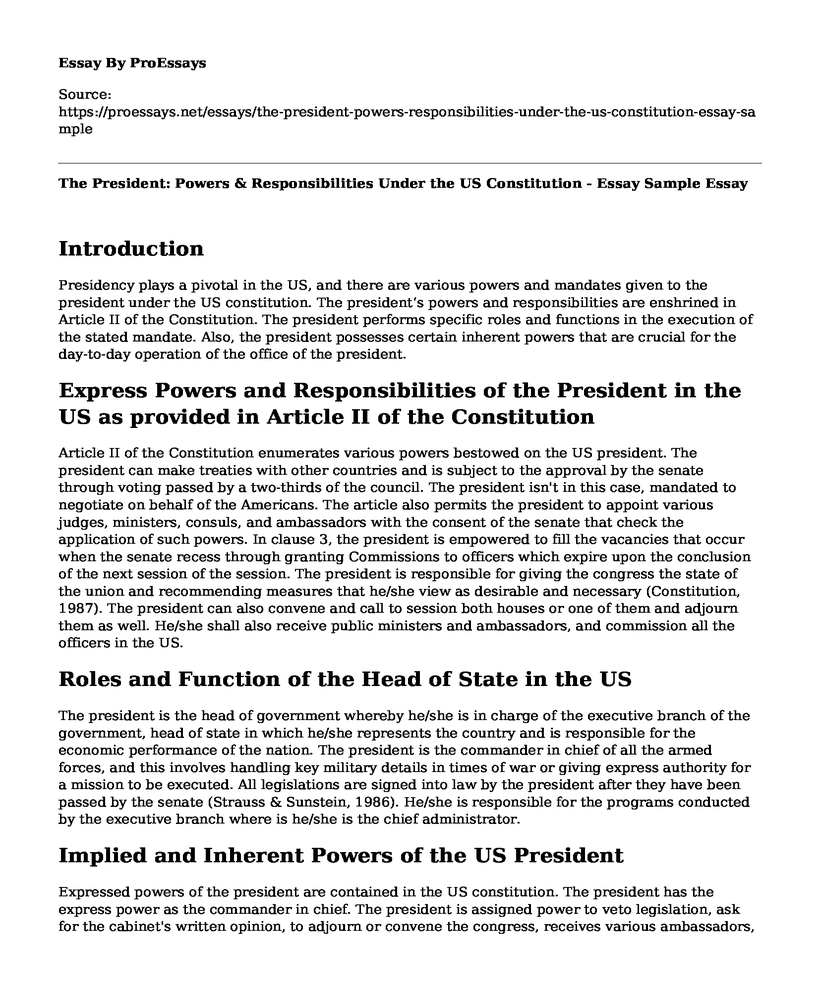Introduction
Presidency plays a pivotal in the US, and there are various powers and mandates given to the president under the US constitution. The president‘s powers and responsibilities are enshrined in Article II of the Constitution. The president performs specific roles and functions in the execution of the stated mandate. Also, the president possesses certain inherent powers that are crucial for the day-to-day operation of the office of the president.
Express Powers and Responsibilities of the President in the US as provided in Article II of the Constitution
Article II of the Constitution enumerates various powers bestowed on the US president. The president can make treaties with other countries and is subject to the approval by the senate through voting passed by a two-thirds of the council. The president isn't in this case, mandated to negotiate on behalf of the Americans. The article also permits the president to appoint various judges, ministers, consuls, and ambassadors with the consent of the senate that check the application of such powers. In clause 3, the president is empowered to fill the vacancies that occur when the senate recess through granting Commissions to officers which expire upon the conclusion of the next session of the session. The president is responsible for giving the congress the state of the union and recommending measures that he/she view as desirable and necessary (Constitution, 1987). The president can also convene and call to session both houses or one of them and adjourn them as well. He/she shall also receive public ministers and ambassadors, and commission all the officers in the US.
Roles and Function of the Head of State in the US
The president is the head of government whereby he/she is in charge of the executive branch of the government, head of state in which he/she represents the country and is responsible for the economic performance of the nation. The president is the commander in chief of all the armed forces, and this involves handling key military details in times of war or giving express authority for a mission to be executed. All legislations are signed into law by the president after they have been passed by the senate (Strauss & Sunstein, 1986). He/she is responsible for the programs conducted by the executive branch where is he/she is the chief administrator.
Implied and Inherent Powers of the US President
Expressed powers of the president are contained in the US constitution. The president has the express power as the commander in chief. The president is assigned power to veto legislation, ask for the cabinet's written opinion, to adjourn or convene the congress, receives various ambassadors, pardons and grant reprieve. The president also has expressed power to make treaties and to remove the executive officers from office. Inherent powers are the assumed powers that are not explicitly stated in the Constitution. The president is required to take care of the law and execute it faithfully, and this is defined as a practice rather than by the Constitution (Fisher, 2007). The inherent power allows the president to make injunctions and declare the position of the US on international matters.
References
Fisher, L. (2007). The Law: Presidential Inherent Power: The “Sole Organ” Doctrine. Presidential Studies Quarterly, 37(1), 139-152. https://onlinelibrary.wiley.com/doi/abs/10.1111/j.1741-5705.2007.02589.x
Strauss, P. L., & Sunstein, C. R. (1986). The role of the President and OMB in informal rulemaking. Administrative Law Review, 181-207. https://www.jstor.org/stable/40709331
Constitution, U. (1987). Article II. This Constitution, and the Laws of the United States which shall be made in Pursuance thereof. http://www.academia.edu/download/33203640/1987_Philippine_Constitution_(Present).doc
Cite this page
The President: Powers & Responsibilities Under the US Constitution - Essay Sample. (2023, Aug 14). Retrieved from https://proessays.net/essays/the-president-powers-responsibilities-under-the-us-constitution-essay-sample
If you are the original author of this essay and no longer wish to have it published on the ProEssays website, please click below to request its removal:
- Trump Campaign Essay
- Counseling for Multiculturalism and Social Justice Reflection Paper
- NAFTA Trade Agreement Essay Example
- Three Types of Elections in Texas - Essay Sample
- Article Analysis Essay on Are You a Robot
- Democratic Party: Weakness or Strength? - Essay Sample
- Essay Example on Unlock Collective Power: Civil Engagement and Interests Groups







